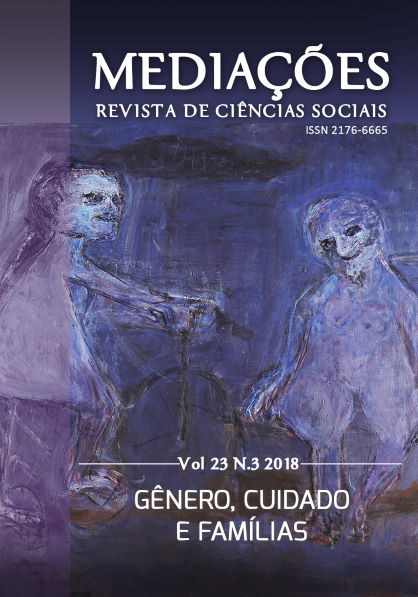The last will be the first, or the prismo of caribeen training as a decolonization of the being
DOI:
https://doi.org/10.5433/2176-6665.2018v23n3p276Keywords:
Fanon, Coloniality, Caribbean, Race relationsAbstract
This work follows the lead of a commentary made by Stuart Hall concerning his own trajectory, which he qualifies by the idea of “prism of Caribbean formation”. The theme is approached by the scope of emancipation, arguing that the search for fulfillment of political universals, of freedom in particular, assumes specific shades in the Caribbean Sea. These shades are, ultimately, where lies the decolonizing potential of being as it had been developed by Nelson Maldonado-Torres. It discuss how a tradition of debates around the subject of emancipation that dates back to Hegel is in the hand of a Caribbean author displaced by such prism of Caribbean formation. Lastly, it argues that the movement accomplished by Fanon does not limit itself to his work, but finds intellectual expression in other authors of the region, and that a political sociology of the Black Atlantic must take it seriously this specific engagement made possible by the “prism” as an analytical category.Downloads
References
BALLESTRIN, Luciana. América Latina e o giro decolonial. Revista Brasileira de Ciência Política, Brasília, n. 11, p. 89-117, maio/ago. 2013.
BORDA, Eric W. B. Que Fanon é esse na teoria cultural contemporânea?. Florestan, São Carlos, ano 1, n. 2, p.133-152, 2014.
BUCK-MORSS, Susan. Hegel, Haiti, and Universal History. Pittsburgh: University of Pittsburgh Press, 2009.
DUDLEY, Will. O idealismo alemão. Petrópolis: Vozes, 2013.
FANON, Frantz. Os condenados da terra. Juiz da Fora: Editora da UFJF, 2005.
FANON, Frantz. Pele negra, máscaras brancas. Salvador: Edufba, 2008.
FAUSTINO, Deivison Mendes. Por que Fanon, por que agora?”: Frantz Fanon e os fanonismos no Brasil. 2015. Tese (Doutorado em Sociologia) - UFSCar, São Carlos, 2015.
FISCHER, Sibylle. Modernity disavowed: Haiti and the cultures of slavery in the age of revolution. Durham: Duke University Press, 2004.
GILROY, Paul. O Atlântico negro. São Paulo: Editora 34, 2009.
HALL, Stuart. Epilogue: through the prism of an intellectual life. In: HALL, Stuart. Culture, politics, race and diaspora. Kingston: Ian Randle Publishers, 2007. Chapter 13.
HALL, Stuart. Antiguas y nuevas identidades y etnicidades. In: HALL, Stuart.Sin garantías: trayectorias y problemáticas en estudios culturales. Popayán: Envión, 2010. Chapter 14.
HEGEL, Georg Wilhelm Friedrich. Fenomenologia do espírito. Petrópolis: Vozes, 1992.
JAMES, Cyril Lionel Robert. Os jacobinos negros. Campinas: Boitempo, 2010.
KANT, Immanuel. Resposta à pergunta: que é esclarecimento? In: KANT, Immanuel. Textos seletos. Petrópolis: Vozes, 1985.p. 100-117.
MALDONADO-TORRES, Nelson. Sobre la colonialidad del ser: contribuciones al desarrollo de un concepto. In: CASTRO-GÓMEZ, Santiago; GROSFOGUEL, Ramon (Coord.). El giro decolonial: reflexiones para una diversidad epistémica más allá del capitalismo global. Bogotá: Iesco-Pensar-Siglo del Hombre, 2007.
ROBERTS, Neil. Freedom as marronage. Chicago: The University of Chicago Press, 2015.
ROLLINS, Judith. And the Last Shall Be First’: the master-slave dialectic in Hegel, Nietzsche and Fanon. Human Architecture: Journal of the Sociology of Self-Knowledge, v. 5, n. 3, Article 16, 2007.
TROUILLOT, Michel-Rolph. Silencing the past: power and the production of history. Boston: Beacon Press, 1995.
TSING, Anna Lowenhaupt. Friction: an ethnography of global connection. Princeton: Princeton University Press, 2005.
Downloads
Published
How to Cite
Issue
Section
License
Copyright (c) 2018 Erik W B Borda

This work is licensed under a Creative Commons Attribution 4.0 International License.
Copyright on articles published in Mediações belongs to the author(s): in the case of partial or entire republication of the original publication, we ask author(s) to indicate the original publication in the periodical.
Mediações uses the Creative Commons Attribution 4.0 International license, which allows Open Access, enabling any user to read, download, copy and disseminate its content so long as adequately referenced.
The opinions expressed by the author(s) are their sole responsibility.
































